

Brave New World, 1984 and Our Society « lukedolan. Peace, Having recently read both Aldous Huxley’s “Brave New World” & George Orwell’s “1984″ I was not only struck by the sheer beauty and eloquence of which both men were able to put across their ideas but also the similarities with our modern society.
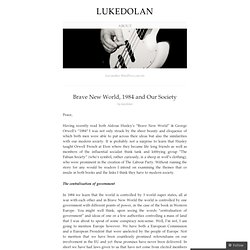
It is probably not a surprise to learn that Huxley taught Orwell French at Eton where they became life long friends as well as members of the influential socialist think tank and lobbying group “The Fabian Society” (who’s symbol, rather curiously, is a sheep in wolf’s clothing), who were prominent in the creation of The Labour Party. Without ruining the story for any would be readers I intend on examining the themes that co inside in both books and the links I think they have to modern society. The centralisation of government Excessive Consumerism Ah yes, my old foe. Brave New World see the inhabitants of Western Europe obsessed, through conditioning, with new leisure activities, new clothes and new machines. Finally… Thought control Peace. Brave New World, 1984 and Our Society « lukedolan. Amusing Ourselves to Death: Public Discourse in the Age of Show Business : Neil Postman. Neil Postman.
Neil Postman (March 8, 1931 – October 5, 2003) was an American author, media theorist and cultural critic, who is best known by the general public for his 1985 book about television, Amusing Ourselves to Death.
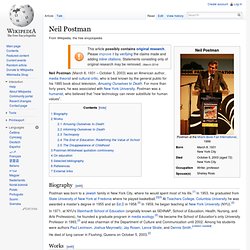
For more than forty years, he was associated with New York University. Postman was a humanist, who believed that "new technology can never substitute for human values". Biography[edit] Postman was born to a Jewish family in New York City, where he would spent most of his life.[1] In 1953, he graduated from State University of New York at Fredonia where he played basketball.[2][3] At Teachers College, Columbia University he was awarded a master's degree in 1955 and an Ed.D in 1958.[2] In 1959, he began teaching at New York University (NYU).[2] He died of lung cancer in Flushing, Queens on October 5, 2003.[2] Works[edit] Amusing Ourselves to Death[edit] Amusing Ourselves to Death was translated into eight languages and sold 200,000 copies worldwide.
Informing Ourselves to Death[edit] The virtual Marshall McLuhan - Donald F. Theall. Marshall McLuhan: the medium and the messenger : a biography - Philip Marchand. The Mechanical Bride: Folklore of Industrial Man. The Mechanical Bride: Folklore of Industrial Man (1st Ed.: The Vanguard Press, NY, 1951)[1] is a pioneering study of popular culture by Herbert Marshall McLuhan, treating newspapers, comics, and advertisements as poetic texts.[2] Like his later 1962 book The Gutenberg Galaxy, The Mechanical Bride is unique and composed of a number of short essays that can be read in any order – what he styled the "mosaic approach" to writing a book.
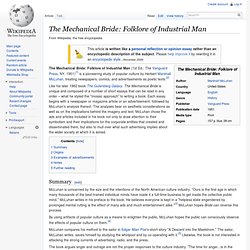
Each essay begins with a newspaper or magazine article or an advertisement, followed by McLuhan's analysis thereof. The analyses bear on aesthetic considerations as well as on the implications behind the imagery and text. Marshall McLuhan. Amusing Ourselves to Death. Amusing Ourselves to Death: Public Discourse in the Age of Show Business (1985) is a book by educator Neil Postman.
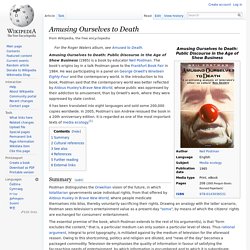
The book's origins lay in a talk Postman gave to the Frankfurt Book Fair in 1984. Social aspects of television. The social aspects of television are influences this medium has had on society since its inception.
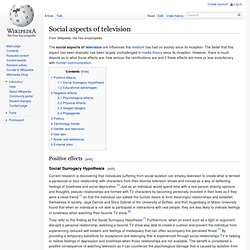
The belief that this impact has been dramatic has been largely unchallenged in media theory since its inception. However, there is much dispute as to what those effects are, how serious the ramifications are and if these effects are more or less evolutionary with human communication. Positive effects[edit] Social Surrogacy Hypothesis[edit] Educational advantages[edit] Several studies have found that educational television has many advantages. Negative effects[edit] Samsung warns of dangers of 3D television. The harmful effects of watching television and videos. What They Don’t Want You To Know About TV and Videos.

During their wanderings, ancient Jewry happened upon some of the most abominable practices of the pagan world, including child-sacrifice. The contrast between the world’s wanton violence and promiscuity on the one hand, and the Torah’s pristine standards and sensitivities on the other, must have been astounding. The Hidden Dangers of Television. Catholic Morality The Hidden Dangers of Television Children's development needs Children learn so much in their first three years compared to the rest of their lives.
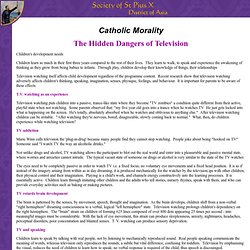
They learn to walk, to speak and experience the awakening of thinking as they grow from being babies to infants. Through play, children develop their knowledge of things, their relationships Television watching itself affects child development regardless of the programme content. Television: Good or Bad? The amount of television a person watches and what it does to the brain has been a controversial issue for some time now, especially when it comes to young minds. Although there are many educational TV programs offered, a lot of the television shows that younger generations are tuning into are completely non-educational. TV viewing good and bad for kids, Seattle study says. A new study by Seattle researchers suggests that television viewing by children younger than 3 can damage their reading comprehension and short-term memory.

But the same study also says that for 3- to 5-year-olds, watching TV may actually improve some cognitive abilities. Researchers say the findings, published today in the Archives of Pediatric and Adolescent Medicine, provide a much-needed analysis of the effects of television viewing among young children, and illustrate how important it is for parents to monitor what their children watch. How TV Affects Your Child. Listen Violence To give you perspective on just how much violence kids see on TV, consider this: The average American child will witness 200,000 violent acts on television by age 18.

Kids may become desensitized to violence and more aggressive. TV violence sometimes begs for imitation because violence is often promoted as a fun and effective way to get what you want. Many violent acts are perpetrated by the "good guys," whom kids have been taught to admire. Young kids are particularly frightened by scary and violent images. Older kids also can be frightened by violent images, whether they appear on fictional shows, the news, or reality-based shows. Lauren Zalaznick: The conscience of television.